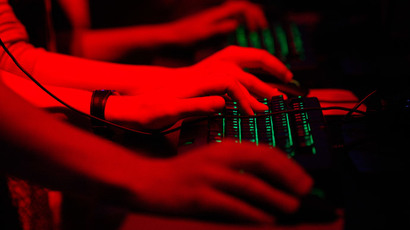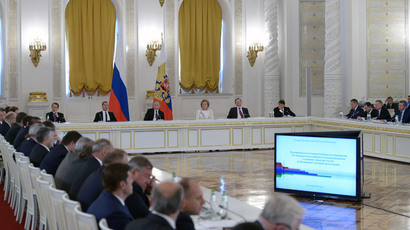Russia won’t disconnect from global internet, works on cyber security – Kremlin

Media reports that Russia is considering disconnecting from the global internet are false, Dmitry Peskov, presidential press-secretary, said. But the country is working to improve cyber security due to the unpredictable behavior of the West, he added.
“Russia’s disconnection from the global internet is of course
out of the question,” Peskov told the Interfax news agency,
adding that such a possibility has never been considered.
However, he stressed that “recently, a fair share of
unpredictability is present in the actions of our partners both
in the US and the EU, and we [Russia] must be prepared for any
turn of events.”
“We all know who the chief administrator of the global internet
is. And due to its volatility, we have to think about how to
ensure our national security,” Vladimir Putin’s
press-secretary said.
When asked if Russia is developing the means to improve its cyber
security, Peskov replied by saying: “We’re working on such
measures, they are being looked at.”
It’s not about disconnecting Russia from the World Wide Web, but
about “protecting it from possible external influence,”
he concluded.
Russia’s communications minister, Nikolay Nikiforov, also denied
claims that the authorities are thinking about cutting ties with
the global internet.
“Recently, Russia is being addressed in a language of
unilateral sanctions: first, our credit cards are being cut off;
then the European Parliament says that they’ll disconnect us from
SWIFT. In these circumstances, we are working on a scenario where
our esteemed partners would suddenly decide to disconnect us from
the internet,” the minister told the RIA Novosti news
agency.
Nikiforov also said that a joint exercise by the Ministry of
Communications, the Defense Ministry and Federal Security Service
was held in order to prepare for such a turn of events.
Earlier on Friday, Vedomosti newspaper cited a number of unnamed
security and industry sources, which said the Russian authorities
are considering the possibility of making the Russian sector of
the net independent.
The paper alleged that the issue will be discussed at several
closed-door events in the days to come, including a national
Security Council session on Monday next week.
However, Peskov told the Interfax news agency that no Security
Council session is even planned for next week.
Vedomosti’s source has said that Russia wants to control and
mitigate the potential damage of a confrontation in cyberspace.
Particularly, it wants the ‘runet’ - the Russian part of the
internet - to be able to operate independently from the rest of
the world in case of emergency, the newspaper cites a security
source as saying.
The goal is not to have ‘an internet of its own’, like North
Korea’s. It’s also not about being able to shut down electronic
communications in Russia in the face of massive riots, as Turkey
and Egypt recently did, although such an option would be
welcomed, the report said.
Rather it is to ensure that if the US government uses its
emergency powers to cut Russian IP addresses from service, then
backup servers would be ready to step in. Back in 2012, US
President Barack Obama signed an executive order allowing him to
take control of all communications on
American soil, including those crucial for the normal operation
of the internet.
The US reportedly once actually cut a country off the internet.
According to NSA whistleblower Edward Snowden, the agency
unintentionally caused an internet blackout
in Syria in November 2012 when it was trying to install spyware
on one of the core routers.
Possible measures, including a government take-over of the .ru
and .рф domain name registrar, come amid Russia’s frustration
with lack of progress in making ICANN, the chief internet
protocol and domain name system body, less dependent on the
United States. For years Moscow has been campaigning to give
ICANN’s job to an organization working under the United Nations.














